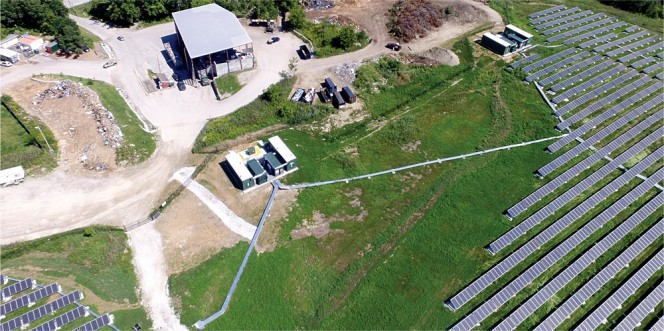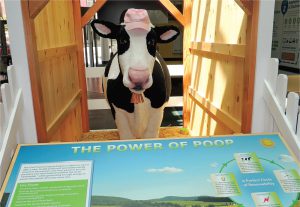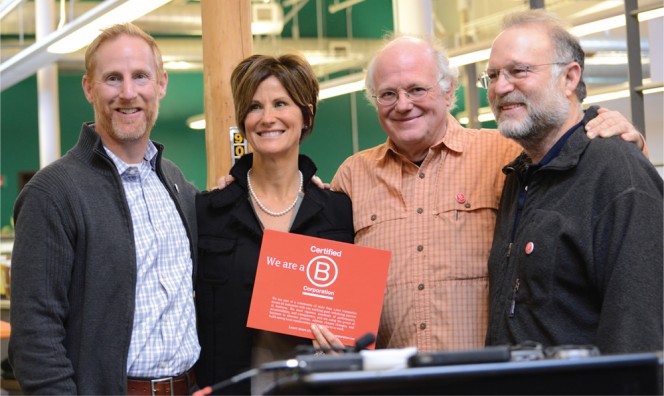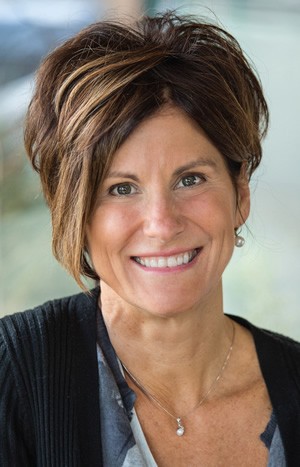Mary Powell, CEO, is leading Green Mountain Power to be a positive force for change, taking the path of lower cost, clean energy. “I am driven to make things better and am not afraid of doing things differently and taking risks,” she tells BioCycle.
Nora Goldstein
BioCycle September 2015
Mary Powell is the President and Chief Executive Officer (CEO) for Green Mountain Power based in Colchester, Vermont. Prior to becoming CEO in 2008, she was the Chief Operating Officer for the company, a position she had held since February 2001. Powell initiated, and implemented, a strategic and comprehensive restructuring of the company that dramatically transformed Green Mountain Power (GMP) and has been the backbone of a cultural transformation and service quality improvement. As CEO, she launched an ambitious energy vision to provide low carbon, low cost and reliable power to Vermonters.
Under her leadership, GMP built Vermont’s largest wind farm, is building New England’s Solar Capital in Rutland, Vermont and installed smart grid technology across the entire utility infrastructure. This month, Powell will be dedicating GMP’s new solar farm and battery storage facility in Rutland. In June 2012, the company closed on an acquisition of Central Vermont Public Service, which had started the Cow Power farm digester program in 2004.
In 2014, Powell announced a pioneering new partnership with NRG Energy, Inc. to make Vermont a leader in sustainable energy and to completely transform the electrical delivery system. The partnership is bringing innovative clean energy products and services to Vermont, while helping customers manage energy use and save money. In 2015, she announced another groundbreaking partnership with Tesla. GMP is the first utility to offer customers a back-up battery to improve reliability and transform the electricity system.

Green Mountain Power’s (GMP) new solar farm and battery storage facility is being dedicated in Rutland, Vermont. It is built on a closed landfill (battery storage units shown connected to solar array).
BioCycle interviewed Mary Powell, Keynote Speaker at BioCycle’s 15th Annual Conference on Renewable Energy From Organics Recycling, October 19-22 in Boston, about her vision for a 21st Century electric utility, the role of anaerobic digestion in the company’s renewable energy portfolio, and if she views GMP as setting the pace for climate-resilient electricity production and distribution.

The GMP Energy Innovation Center in downtown Rutland, Vermont serves as a visitors and education center. Displays showcase energy efficiency and renewable energy technologies, including Electra and Cow Power.
BIOCYCLE: You use the phrase “low cost, low carbon” to describe your energy vision. Please define low cost, low carbon energy. What is in the mix, and what is the role that biogas from anaerobic digesters plays in that mix?
POWELL: Low cost and low carbon means we are delivering clean energy that is cost-effective and reliable to customers. Delivering that requires ramping up renewable generation, while still keeping rates low. We are laser focused on that and have had three bill decreases in the last four years. While we are lowering costs, we are staying on the cutting edge of innovation, whether it is battery storage, comprehensive home energy makeovers, or digesters on the farm. We have worked with farmers in Vermont to generate power from cow manure, and we offer our customers the ability to purchase a portion of their [electricity] use entirely from Cow Power. Our customers appreciate the ability to purchase local, farm-generated power while helping farmers. We see great opportunity to grow this renewable resource and are about to expand into multifarm digesters that will create value for farmers, generate clean electricity and help clean up Lake Champlain.
BIOCYCLE: You were interviewed by Bill McKibben for his article, “Power To The People,” in the June 29, 2015 issue of The New Yorker. The “energy makeover” example of the Borkowski family in Rutland, Vermont illustrates how today’s energy efficiency and renewable energy technologies and services provide an opportunity for power companies to change how they currently do business. Green Mountain Power is clearly taking advantage of and investing in renewable energy and energy efficiency, as well as distributed energy and smart grid technologies. Is your utility in a unique environment that makes it possible to tap in, or could utilities in any state ride this wave?
POWELL: We are focused on delivering what customers tell us they want — to save money, reduce fossil fuel use and be more comfortable. Leaning in and being customer obsessed is our touchstone everyday. We want to accelerate the pace of change and find new ways to benefit customers. With climate change, there is also an imperative to act. In Vermont, we do have support from our customers, lawmakers and state leaders.
BIOCYCLE: As a follow-up, BioCycle describes Green Mountain Power as a 21st Century Electric Utility. In other words, GMP is an operating definition of a “utility of the future.” As CEO, do you feel like a revolutionary? A trendsetter? Or simply a realist?
POWELL: I think I am a realist, with a bit of revolutionary, who focuses on getting things done. At GMP, we want our work to be fast, fun and effective. We believe energy can change lives and transform communities. We want to help people use less energy and move toward smart electrification. This is what our customers tell us they want, whether it’s distributed energy resources, community projects, solar, wind, or a new way to track and control energy use remotely with mobile technology.
BIOCYCLE: Are there a growing number of utilities following the low cost, low carbon path?
POWELL: We focus on the exciting transformation taking place in Vermont. There is certainly some movement with other utility leaders, however it seems that most are still resisting the movement to solar and distributed generation.
BIOCYCLE: In terms of moving more rapidly to address climate change, a recent article in BioCycle concluded that the only long-term effective solution in market-driven societies is to put a price on carbon. Do you agree? Given your experience, using widespread adoption of renewable energy as a case in point, are there other effective options?
POWELL: We want to act. And see change through transformation of communities and homes. We are seeing success when you can save people money, and partner with them on solutions that also help the environment. While this is happening, Vermont has renewable portfolio standards that will mean the continued rapid adoption of more clean energy. This is the path we are on, and one that we think will lead to real change.
BIOCYCLE: Focusing more specifically on anaerobic digestion, what do AD facilities bring to the table that solar and wind cannot?
POWELL: One advantage is they operate as baseload power — consistent generation 24-7. And the economic benefit for farmers and nutrient management for the protection of the watershed are unique to biodigesters.
BIOCYCLE: What is the role of AD in a microgrid, especially in terms of grid resiliency?
POWELL: This is what is so exciting. There are tremendous opportunities to microgrid around AD. We are moving toward an energy future where energy is generated and used closer to home, and anaerobic digesters are a key part of that.
BIOCYCLE: In many states, electric utilities are obstacles to the viability of digester projects, especially with regard to interconnection costs and reasonable power purchase agreements. What solutions, if any, do you see to address this situation?
POWELL: For us, we see the value of digesters. It helps farms, helps generate renewable energy, and also will help keep phosphorus pollution from Lake Champlain. These all have tremendous value and are what we look at. Doing business the same way is not an option, and leaning in to these innovative solutions is what our future looks like.

GMP is the first utility in the world to receive B Corp certification, having met rigorous standards of social and environmental performance, accountability and transparency.
Joining Mary Powell at the celebration last December are (from left to right):
Jay Coen Gilbert, cofounder of B Lab, and Ben Cohen and Jerry Greenfield, founders of Ben & Jerry’s,
also a B Corp.
BIOCYCLE: Last December, Green Mountain Power became the first utility in the world to receive B Corp Certification. To get certified, B Corp companies must meet B Lab’s (the nonprofit certifier) rigorous standards of social and environmental performance, accountability and transparency. As CEO, why is it important for GMP to be a Certified B Corp?
POWELL: GMP wants to accelerate the pace of change, and find new ways to benefit customers. That passion to be a force for positive change is why we are so honored and excited to become a member of B Corp. It will push us to continue to think of ways to be better — better for employees, better for communities and better for the environment. These are all steps that are making us Vermont’s Energy Company of the Future.
BIOCYCLE: Finally, you have been an entrepreneur during your career. How has that influenced your approach as CEO of Green Mountain Power, e.g., in terms of risk taking and venturing where your counterparts at other utilities have not yet gone?
POWELL: I am driven to make things better and am not afraid of doing things differently and taking risks. As an entrepreneur I see possibilities that are not being met, and I see that we have an incredible opportunity to totally transform our industry to benefit customers and the environment.












